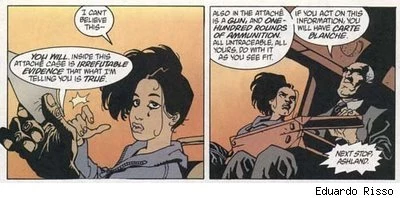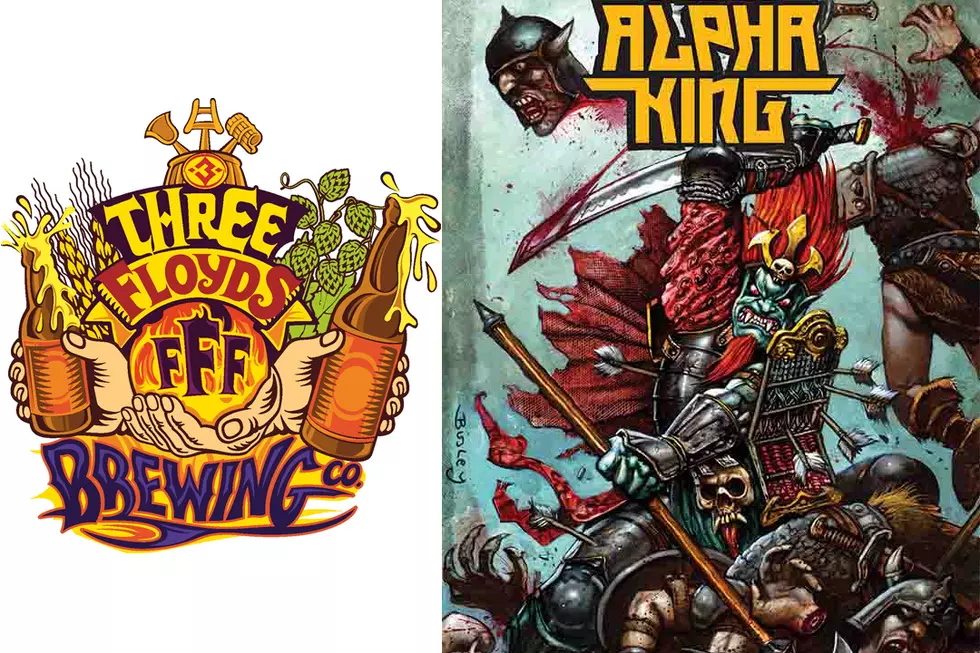
Comics We Love: Vertigo’s ‘100 Bullets’ By Brian Azzarello & Eduardo Risso

If a stranger offered you a briefcase containing a gun, 100 completely untraceable bullets, and incontrovertible evidence identifying the person responsible for the worst thing that's ever happened to you, and the promise of full immunity for your retribution, would you take it?
The mysterious man in question is Agent Graves, and he and his briefcase full of hot flaming death are the center of one of the most important comics of the last decade. And beginning this week with a 456-page inaugural hardcover collection, 100 Bullets finally receives the deluxe treatment it deserves, a fitting format for the book that changed Vertigo and cast a cold, hard light into the unexplored areas of noir comics.

DC Comics' mature readers imprint, the house of Vertigo was built on the foundations laid by the British Invasion of the 1980s and early 1990s - gothic, surreal, and typically supernatural horror stories that could never fit in the superhero-centric DC Universe. And for years after the imprint's inception, that remained the zeitgeist. The Vertigo "genre" was a broad one, and allowed for many excursions, but it was never hard to identify stories that fit the Vertigo mold. Surprisingly, for the longest time that model didn't include much noir.
Though most of what Vertigo published had an aura of darkness, there were few, if any, straight forays into the crime/noir tradition. Sandman Mystery Theatre was a steadfast exception, with 70 issues of adventures based firmly in the pulp vein, but even that series lacked the hard edge of real crime fiction. For the first decade and a half of its existence, Vertigo lived off the model established by the Brits, and stuck to that even when there weren't many Brits left for the publisher to hang its hat on. Vertigo seemed to realize that in the late 1990s, and through a series a short stories, one-shots, and limited series, subtly influenced the imprint's focus to matters of the street. In 1998, the dark, quirky, and violent Jonny Double teamed writer Brian Azzarrello with Argentine artist Eduardo Risso, and all the elements were in place to enact a dramatic shift in Vertigo's publishing line.

That shift came with 100 Bullets. Combining the best elements of Frank Miller's hardboiled Sin City with the cool intrigue of pulp novelists like David Goodis and Richard Stark, and the crystalline structure of Watchmen, the series immediately ensnared readers and established American comics' new interest in dark, twisted tales of revenge populated with dirty slang, deadly ingenues, and lots and lots of corpses.
The powerful hook of the case of 100 untraceable bullets is just the lure that draws the readers into a bigger, deeper, darker story of power and retribution. The first three major story arcs, collected in the first Deluxe Hardcover from Vertigo, take the conceit of the untraceable bullets and begin building a much larger idea, one plot thread at a time.
The first to receive Agent Graves' gift is Dizzy Cordova, a young woman fresh out of prison and still hurting from the deaths of her husband and infant son. Dizzy is the template for recipients of the case: those at rock bottom or close to it, morally flexible, but possessing a potential that even they don't seem aware of. The complete cast of 100 Bullets characters is long and inclusive, from minor players to big shots, each of them encumbered with some sense of loss. They're all offered the briefcase at a crucial nexus in their lives, and their choices - to take or refuse, to kill with impunity or enact their revenge - drag the readers through the muck and horror of a real hard-knock life.

100 Bullets is unflinching in its portrayal of crime and the lives of its perpetrators, and the realism Azzarrello and Risso establish very early on is convincing. Like a David Mamet script, real cons probably don't talk like the offenders in 100 Bullets, but they should. There's a post-modern awareness to the dialogue that is sometimes too apparent, but overall Azzarrello manages a fine balance of an Alan Moore-type self-reference with the snappy, rhythmic beat-speech of classic noir, with great care taken to convey the rhythm and cadence of speech. Azzarrello's characters are all rich with secrets and hidden depth, never failing to make unexpected choices that keep the reader guessing. The game being played is a long-con, and each moving piece affects the outcome.
The style, pacing, and intensity that Eduardo Risso brings to the story is phenomenal. The sense of life he imbues to the characters with his cartooning is on a level few can claim. His halting, dynamic blacks frame the action in a startling bleakness, with a touch of sensationalism that recalls Metal Hurlant. Every page in 100 Bullets is a joy to look at, even when portraying the worst possible things you could imagine doing with a rusty meat thermometer.
Harsh storytelling is on display in 100 Bullets, complete with dirty sex, graphic violence, and a skull******* ****load of offensive ****** language. Ass damn hell. The book took Vertigo's hard-R as far as it could go, and portrays sleazy, violent acts as realistically as possible. But despite all the hardboiled action, the stories are never without heart. These characters being offered the case are complete people, morally complex and capable of violence, but also capable of love, of caring for someone or something other than themselves. It's that dichotomy that the first quarter of the series, collected in this volume, explores. What these people love versus what they desire; a life of violence versus a life of peace; the value of one person's life over another.

100 Bullets isn't cheap and tawdry for the sake of being cheap tawdry; it's a twisting, bloody journey through the nature of crime in America, back to its origins in the greatest crime in American history. The shadowy backgrounds of 100 Bullets and Agent Graves are slowly revealed in the stories of Dizzy Cordova, Loop Hughes, Cole Burns, Lono, and dozens of others who come in and out of focus, throw events into motion and disappear, unleash pure chaos on perfectly-laid plans, or just plain die after they've already become important to the reader.
In its decade-long run, the series was consistently one of the sharpest, edgiest, best-looking books on the stands. (One assumes DC Vertigo's Deluxe treatment will include a cover gallery, hopefully each of the 100 individual issues wrapped by the wildly innovative Dave Johnson.) 100 Bullets changed the way a lot of people were thinking about comics at the time, confirmed the resurgence of the crime genre and led the way for new philosophies at Vertigo, ensuring the line's relevance into the 2000s. Along the way, it nabbed numerous Eisner and Harvey awards, for everything from series, writer, artist, colorist, probably even the guys who stapled it. There's currently a series in development for Showtime by David S. Goyer (screenwriter of the Blade trilogy and co-writer of The Dark Knight), and even the most staunch purists would have to admit a rated R 100 Bullets television series would be awesome.
Though the comic wrapped up in 2009, Azzarrello and Risso have already cranked out a number of collaborations, including the chilling Batman story for Wednesday Comics, and the upcoming Spaceman, also for Vertigo.
So c'mon newbies. Get on board, completists. Take the briefcase. I would.
More From ComicsAlliance

![Heroes Hit Hard In ‘DKIII’ #6 [Preview]](http://townsquare.media/site/622/files/2016/09/DKTMR_6_featured.jpg?w=980&q=75)





![The Emerald Knight Returns in ‘Dark Knight Universe Presents: Green Lantern’ [Preview]](http://townsquare.media/site/622/files/2016/01/dkgl_featured.jpg?w=980&q=75)

